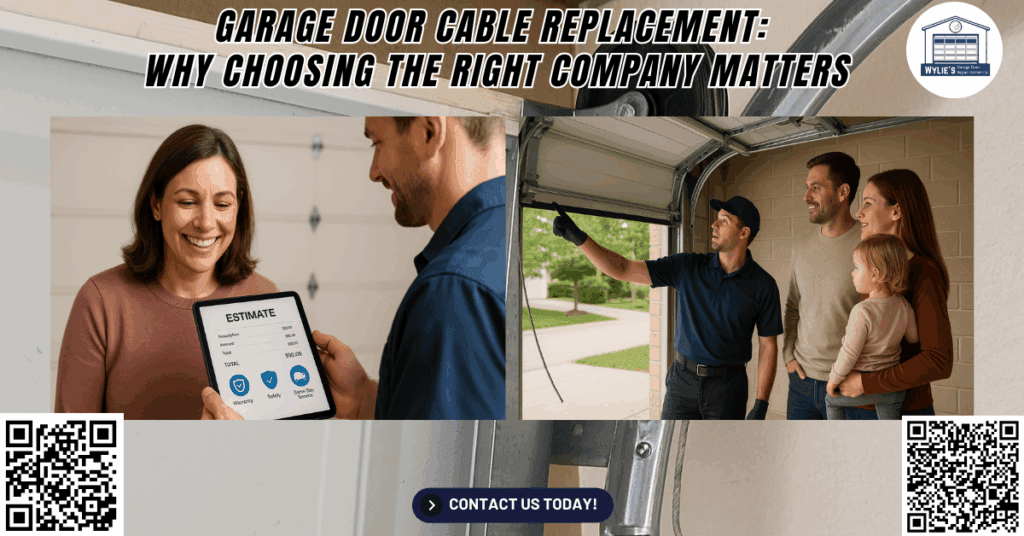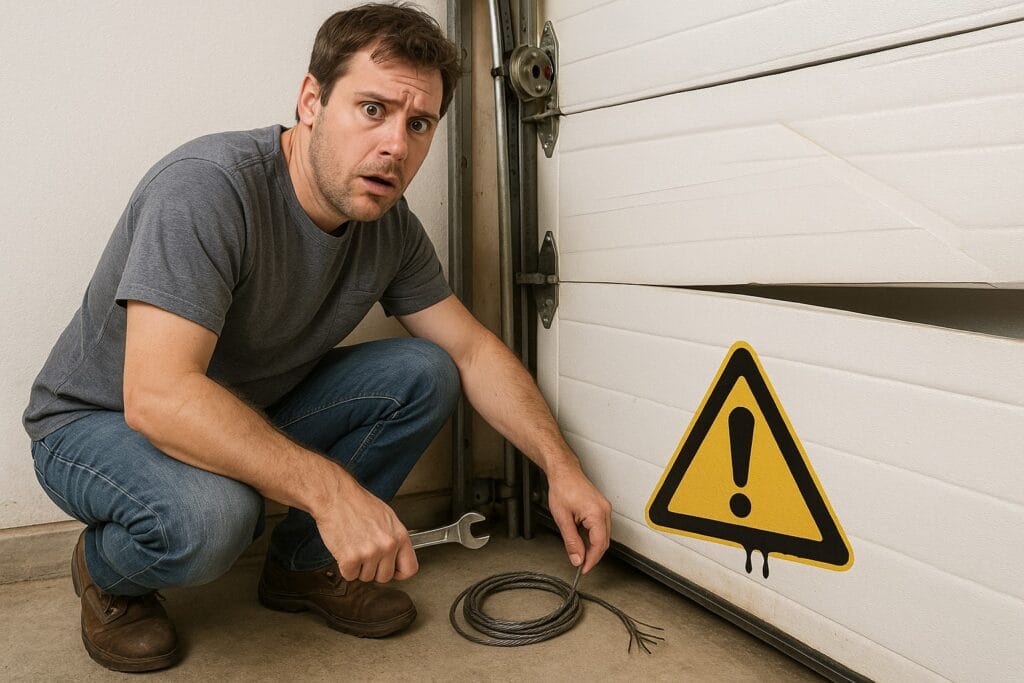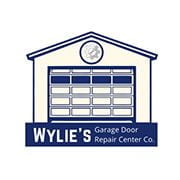
A few weeks ago, a homeowner in the heart of Wylie, TX, called us with a scary situation: their garage door had suddenly dropped on one side and jammed halfway down. They had a car trapped inside and didn’t know what had gone wrong. Upon arrival, our team at Wylie’s Garage Door Repair Center Co. discovered that the garage door cable had snapped due to years of wear, rust, and lack of maintenance. Fortunately, no one was injured, but it could have ended much worse.
This isn’t a rare case. Each year, thousands of homeowners and commercial property managers deal with garage door failures, often caused by overlooked components like cables. According to recent safety reports, garage doors cause over 20,000 injuries annually in the U.S. Many of these are directly related to worn-out garage door parts like springs, rollers, hinges, and yes, cables.
That’s why understanding the importance of proper cable replacement and hiring the right company to handle it isn’t just smart, it’s essential. In this article, we’ll dive into everything you need to know about garage door cables, including their role in larger systems, common failure signs, materials, installation techniques, and why a professional touch can make all the difference. We’ll also explore related components like torsion springs, garage door openers, and custom fabrication options for modern garage designs.
What Exactly Are Garage Door Cables?
Garage door cables are strong, flexible metal wires, typically made of steel, that are responsible for supporting and counterbalancing the weight of your garage door. These cables are tightly wound and work alongside your door’s spring system (either torsion or extension) to ensure smooth, balanced opening and closing.
Two Main Types of Cables
- Torsion Spring Cables – Used with torsion spring systems, these cables wrap around a cable drum located at the top corners of the door.
- Extension Spring Cables – Used with older systems, these run through pulleys and stretch as the door operates.
Without these cables in proper condition, the door can become dangerously unbalanced, putting pressure on other parts like garage door hinges, rollers, and even the garage door opener motor. Cable failure can lead to loud snapping sounds, misalignment of the door tracks, or a door completely detaching from its system.
Why Garage Door Cables Are Essential to the Whole System
Your garage door is a complex machine, a system of interconnected parts and precision-engineered components that must work in perfect harmony. Think of garage door cables as the “tendons” of this mechanical body.
They connect moving parts and handle the weight of the door every time you press the remote, pull the chain, or activate your smart garage door kit. When cables are damaged or misaligned, other parts of the system suffer too, including:
- Torsion Springs & Extension Springs – Uneven cable tension puts unnecessary stress on these components.
- Garage Door Rollers – Misbalanced doors twist tracks and strain rollers.
- Garage Door Openers – Motors burn out trying to lift uneven weights.
- Bottom Brackets & Drums – Cables that slip off can cause hardware damage and jams.
- Garage Door Operator Systems – Including commercial openers and residential accessories, which require proper cable balance for optimal performance.
Proper garage door maintenance is about more than fixing what’s broken; it’s about preventing a domino effect of damage across your system’s components and fabrication elements.
Common Signs You Need Garage Door Cable Replacement
Garage door cables rarely break without warning. They usually give clear signs when they’re wearing out. Here’s what to watch for:
1. Frayed or Rusted Cables
Steel cables weaken over time due to rust and daily wear. If you notice rust spots, broken strands, or fraying along the cables, they’re likely close to failure. Damaged cables can snap suddenly, creating safety risks.
2. Uneven Garage Door Movement
If one side of the door rises faster or looks crooked, a cable may be stretched, loose, or broken. Uneven movement strains other parts of your garage door system and can lead to bigger problems if ignored.
3. Jerky or Noisy Operation
Loud grinding, popping, or squeaking sounds often point to tension or alignment issues with the cables. A smooth-operating garage door shouldn’t make these noises.
4. Garage Door Won’t Open Properly
When a cable fails, the opener might struggle to lift the door. Common signs include the door refusing to open, only opening a few inches, or reversing suddenly.
5. Slack or Loose Cables
Visible slack near the bottom bracket or drum typically means the cable has slipped off or snapped. This affects the door’s balance and prevents safe operation.
Why It Matters
Ignoring these signs increases the risk of a sudden breakdown or injury. Addressing cable issues promptly helps protect your door system, prevents expensive repairs, and keeps your home or business safe.
What Causes Garage Door Cables to Fail?
Like any hardworking mechanical part, garage door cables are prone to wear, fatigue, and eventual failure. Several common factors contribute to cable problems over time:
1. Daily Wear & Tear
Garage door cables are under constant tension and support significant weight every time the door opens and closes. Even the highest-quality cables have a service life. In high-use settings, like busy households or commercial facilities, this wear accelerates.
2. Moisture & Corrosion
Moisture infiltrates the strands of the steel cable, leading to rust and corrosion. This is especially common in garages without proper climate control or those exposed to rain, humidity, or road salt. Rust weakens the cable’s structural integrity, increasing the risk of fraying or snapping.
3. Improper Installation
Cables need to be installed with precise tension and properly aligned on the drum. If an installer sets them up incorrectly, too loose, too tight, or misaligned, this puts uneven stress on the cables and often leads to premature failure.
4. Poor Materials
Low-grade cables, especially non-galvanized ones, wear out faster. Cheap materials are more prone to corrosion, fraying, and stretching, making them far less reliable over time.
5. Unbalanced Garage Doors
When a garage door’s springs are improperly balanced or misaligned, the cables on one side bear more of the load than the other. This uneven tension causes the cables to stretch unevenly, wear faster, and eventually fail.
Why DIY Cable Replacement Is Dangerous

Many homeowners enjoy tackling DIY projects around the house, but garage door cable replacement should never be one of them. This repair involves working with high-tension systems, heavy equipment, and precision components. Here’s why attempting it yourself is risky:
1. High Tension is Extremely Dangerous
Garage doors often weigh 200 to 300+ pounds, and the torsion springs and cables are under immense tension to support that weight. A single slip during removal or installation can cause cables, springs, or metal parts to snap loose with explosive force, leading to serious injury.
2. Specialized Tools Are Required
This isn’t a job for a basic toolkit. Proper cable replacement requires:
- Winding bars
- Torque wrenches
- Cable crimpers
- Ladder stabilizers
- Other specialty tools designed specifically for high-tension systems
Without these tools, safely handling and securing the cables is nearly impossible.
3. System Rebalancing is Critical
Replacing cables isn’t just swapping out parts, it involves rebalancing the entire door. The springs must be precisely tensioned to ensure smooth, level movement. Incorrect balance can cause premature wear on the opener, tracks, and rollers, or cause the door to slam shut unexpectedly.
4. No Room for Error
One misstep with routing or tensioning the cables can lead to:
- Bent or damaged tracks
- Broken garage door openers
- Doors coming off the tracks entirely: The margin for error is extremely small, and the consequences can be expensive or dangerous.
Trust the Professionals
When dealing with precision hardware, high-torque components, and heavy moving doors, it’s simply safer and smarter to leave this work to licensed professionals. Experienced technicians have the training, tools, and knowledge to complete the job safely and correctly the first time.
How a Professional Company Ensures Safe, Long-Lasting Repairs
When you call Wylie’s Garage Door Repair Center Co., you’re not just getting someone to “swap a cable.” You’re getting a full-system, safety-first solution that includes:
- ✔️ Inspection of all garage door parts, including rollers, springs, bottom brackets, and safety sensors.
- ✔️ Precision machining to trim and fit cables with correct torque settings.
- ✔️ Use of commercial-grade components like galvanized steel cables, energy-efficient seals, and compliant control accessories.
- ✔️ Lubrication with high-performance grease to reduce friction and increase cable lifespan.
- ✔️ Rebalancing of the spring system for smooth, silent operation.
We don’t just fix what’s broken. We strengthen your whole door system.
Why Choosing the Right Company Matters
Plenty of contractors claim they can fix garage doors, but not all of them understand the engineering, safety standards, and manufacturing quality behind today’s garage door systems. Choosing an experienced, reputable company makes all the difference in ensuring your door operates safely, reliably, and efficiently. Here’s why expertise matters:
1. Knowledge of All Systems
From heavy-duty roll-up steel doors to elegant decorative carriage house designs, our technicians have hands-on experience with every type of garage door. This includes custom-built doors, commercial overhead doors, security gates, and residential opener systems. We know the nuances of how each type functions and how to fix them correctly.
2. High-Quality Parts Only
We never cut corners by using cheap, unreliable parts. Every cable, drum, bracket, bolt, and spring we install comes from trusted manufacturers and meets or exceeds industry safety standards. Quality materials mean fewer future breakdowns and longer-lasting repairs.
3. Transparent Pricing
With us, you’ll always know what you’re paying for. We clearly explain what needs repair, what doesn’t, and why no surprise fees, no hidden charges, and no pressure to buy parts or services you don’t need.
4. Licensed and Insured
Our technicians are fully licensed, insured, and certified to work on every aspect of your garage door system from panels and windows to complex automatic openers and smart controls. This protects you and ensures your job is done right and to code.
5. Customer Reviews and Local Trust
With years of reliable service throughout Wylie, we’ve earned the trust of homeowners, businesses, and property managers alike. Our reputation is built on honest work, dependable results, and outstanding customer service, whether we’re repairing a single residential door or servicing a large commercial facility.
Questions to Ask Before Hiring a Garage Door Company
Here’s a checklist of what you should ask before hiring someone for cable replacement:
- Do you use galvanized or stainless steel cables?
- Are your technicians trained in torsion and extension spring systems?
- Do you check the entire door system or just the cables?
- What warranties do you offer on replacement parts?
- Do you carry insurance for on-site injuries and property damage?
- Can you provide recent customer reviews?
These questions help you filter out “one-man shops” from companies that provide real value, proper safety, and long-term solutions.
Related Parts You Might Also Need
When cables go bad, it’s often a sign that other parts are wearing out too. Here are components that often get replaced or serviced during a cable repair job:
- Torsion Springs
- Extension Springs
- Drums & Pulleys
- Garage Door Hinges
- Rollers & Tracks
- Garage Door Openers
- Remote Replacements & Sensors
- Reinforcement Brackets
- Weather Seal Solutions
- Lag Bolts, Screws & Fasteners
- Garage Door Windows or Decorative Overlays
We stock parts for nearly every model and garage door make, including Craftsman, LiftMaster, Genie, Wayne Dalton, and more.
Final Thoughts: Don’t Wait Until It’s Too Late
Garage door cable failure isn’t something to put off. A snapped cable can turn a routine day into an emergency in seconds. Your garage door protects your home, your business, and your family, and deserves expert attention. Whether you own a newly built home, run a small machine shop, or manage a retail facility, the right garage door service provider makes all the difference.
You don’t have to wait until something breaks to get expert advice. Preventive maintenance and professional inspections can help catch problems before they cause breakdowns or safety hazards. Don’t settle for guesswork. Choose expertise, quality, and safety.
How Can Wylie’s Garage Door Repair Center Co. Help You?
At Wylie’s Garage Door Repair Center Co., we go beyond simple fixes. We offer precision repairs, custom installation, and top-tier garage door services for residential and commercial clients in Wylie and surrounding communities.
- 👷️ Certified Technicians
- 🪰 Top-Tier Garage Door Parts
- 🚚 Same-Day Emergency Garage Door Repair Service
- 🏡 Local & Family-Owned
- 🔧 Backed by a Satisfaction Guarantee
📍 Visit Us:
10000 Walnut St, Dallas, TX 75243
📞 Call Now:
(469) 838-5939
🗓️ Need an Inspection?
Reach out today for a fast, friendly quote, or schedule a service call and let our team restore your garage to safe, efficient operation.
Frequently Asked Questions (FAQs)
1. How long does it take to replace garage door cables?
Most professional garage door cable replacements take about 1 to 2 hours, depending on the door type and whether other components need adjustment.
2. Can cold weather affect garage door cables? Yes, extreme cold can make cables more brittle and prone to fraying or snapping, especially if they already have signs of wear or rust.
3. Are garage door cables universal or specific to the door model?
Garage door cables vary in length, thickness, and drum compatibility, so it’s important to use the correct size for your specific garage door system.
4. How much does it usually cost to replace garage door cables?
On average, cable replacement by a professional can cost between $150 and $250, including labor and parts, depending on your door system and location.
- 7 Signs You Need Emergency Garage Door Repair Services
- Wylie, TX Automatic Garage Doors: Troubleshooting and Tips
- Wylie, TX Garage Door Maintenance: Keep Your Garage Doors in Perfect Condition
- Garage Door Types in Wylie, TX: How to Match Style With Functionality
- Why Routine Commercial Garage Door Repair Is Important for Wylie, TX Businesses
